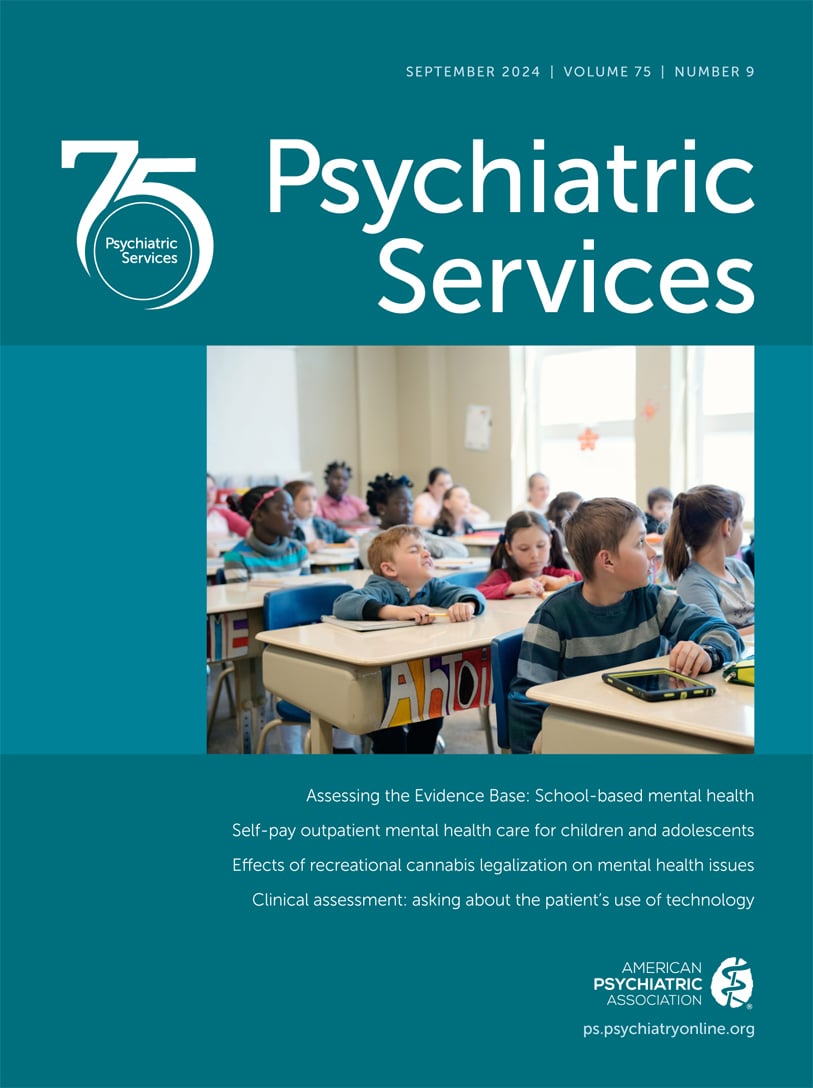Psychiatric Services
- Volume 63
- Number 7
- July 2012
Taking Issue
This Month's Highlights
Columns
Publication date: 01 July 2012
Pages630–632The case of Jared Lee Loughner, who killed or wounded 19 people in a shooting rampage in Tucson, demonstrates the confusion inherent in current rules for the treatment of defendants with mental illness. Found incompetent to stand trial and committed for ...
https://doi.org/10.1176/appi.ps.201200630Publication date: 01 July 2012
Pages633–635In 2005, Maryland received a mental health transformation grant from the Substance Abuse and Mental Health Services Administration. Maryland's transformation efforts have differed from those in other grantee states and have evolved into a shared ...
https://doi.org/10.1176/appi.ps.201200212Articles
Publication date: 01 July 2012
Pages637–642Medicare Part D drug plans specifically exclude coverage of benzodiazepines, largely because of concerns over safety and inappropriate use. However, benzodiazepines are an effective, low-cost treatment for anxiety. This study used national data to examine ...
https://doi.org/10.1176/appi.ps.201100331Publication date: 01 July 2012
Pages643–648Individuals experiencing a mental health crisis can be held on a temporary detention order (TDO) before a civil commitment hearing is required. TDO periods, which permit stabilization and evaluation of patients, vary across the U.S. from 48 hours to 30 ...
https://doi.org/10.1176/appi.ps.201100359Publication date: 01 July 2012
Pages649–654Objectives: Despite the many studies of public attitudes toward mental illnesses, relatively few have examined the views of the youngest generation of citizens. This study was intended to increase understanding of youths' views of mental illness by ...
https://doi.org/10.1176/appi.ps.201100358Publication date: 01 July 2012
Pages655–659Movie portrayals of people with mental illness often perpetuate negative stereotypes. This review of 41 movies released between 1990 and 2010 that featured at least one main character with schizophrenia found that most characters engaged in dangerous or ...
https://doi.org/10.1176/appi.ps.201100371Publication date: 01 July 2012
Pages660–665Objective: The study evaluated the efficacy of three training modalities and the impact of ongoing consultation after training. Cognitive-behavioral therapy (CBT) for anxiety among youths, an empirically supported treatment, was used as the exemplar. ...
https://doi.org/10.1176/appi.ps.201100401Publication date: 01 July 2012
Pages666–671Objective: Hospitalization is a critical component of treatment for individuals with serious and persistent mental illness. Despite its resource intensity, the costs of inpatient psychiatric hospitalizations in the United States are not well understood. ...
https://doi.org/10.1176/appi.ps.201100402Publication date: 01 July 2012
Pages672–678Objective: The purpose of this study was to direct attention to mental health issues that may occur around discharge of patients hospitalized for general medical issues. This study provides a methodology and tested whether postdischarge mental health care ...
https://doi.org/10.1176/appi.ps.201100457Publication date: 01 July 2012
Pages679–685Objective: This study assessed changes since 2007 at Veterans Health Administration (VHA) facilities (N=129) in use of the medications approved by the U.S. Food and Drug Administration for treatment of alcohol use disorders. Methods: VHA data from fiscal ...
https://doi.org/10.1176/appi.ps.201000553Publication date: 01 July 2012
Pages686–692Objective: Culture figures prominently in discussions regarding the etiology of alcohol and substance abuse in American Indian and Alaska Native (AI/AN) communities, and a substantial body of literature suggests that it is critical to developing meaningful ...
https://doi.org/10.1176/appi.ps.201100399Publication date: 01 July 2012
Pages693–701Objective: Cardiovascular disease is the most frequent cause of death of persons with severe and persistent mental illness, and there is evidence of a widening mortality gap with the general population. Modifiable risk factors for cardiovascular disease, ...
https://doi.org/10.1176/appi.ps.201100475Open Forum
Publication date: 01 July 2012
Pages702–704People who experience mental illness can be viewed as either fundamentally different than, or fundamentally like, everyone else in society. Recovery-oriented mental health systems focus on commonality. In practice, this involves an orientation toward ...
https://doi.org/10.1176/appi.ps.201100521Brief Reports
Publication date: 01 July 2012
Pages705–707Objective: The authors compared outcomes reported by patients who did or did not return for treatment after an initial psychotherapy visit. Methods: Members of a group health plan were surveyed about initial psychotherapy visits occurring between March and ...
https://doi.org/10.1176/appi.ps.201100309Publication date: 01 July 2012
Pages708–710Objective: The study examined the relationship between fidelity of strengths model case management (SMCM) and client outcomes of psychiatric hospitalization, competitive employment, postsecondary education, and independent living. Methods: Data were ...
https://doi.org/10.1176/appi.ps.201100373Publication date: 01 July 2012
Pages711–713Objective: This study estimated attitudes and beliefs about treatment in a national sample of college students with untreated mental health problems. Methods: A retrospective analysis of the 2007 and 2009 Healthy Minds Study, an online survey of college ...
https://doi.org/10.1176/appi.ps.201100250Publication date: 01 July 2012
Pages714–717Objective: Persons with serious mental illness have an increased mortality rate and a higher burden of many medical conditions compared with persons without serious mental illness. Cancer risk in the population with serious mental illness is uncertain, and ...
https://doi.org/10.1176/appi.ps.201100169Frontline Reports
Letters
News & Notes
Past Issues
View Issues Archive
Vol. 75 | No. 12

Vol. 75 | No. 11

Vol. 75 | No. 10
